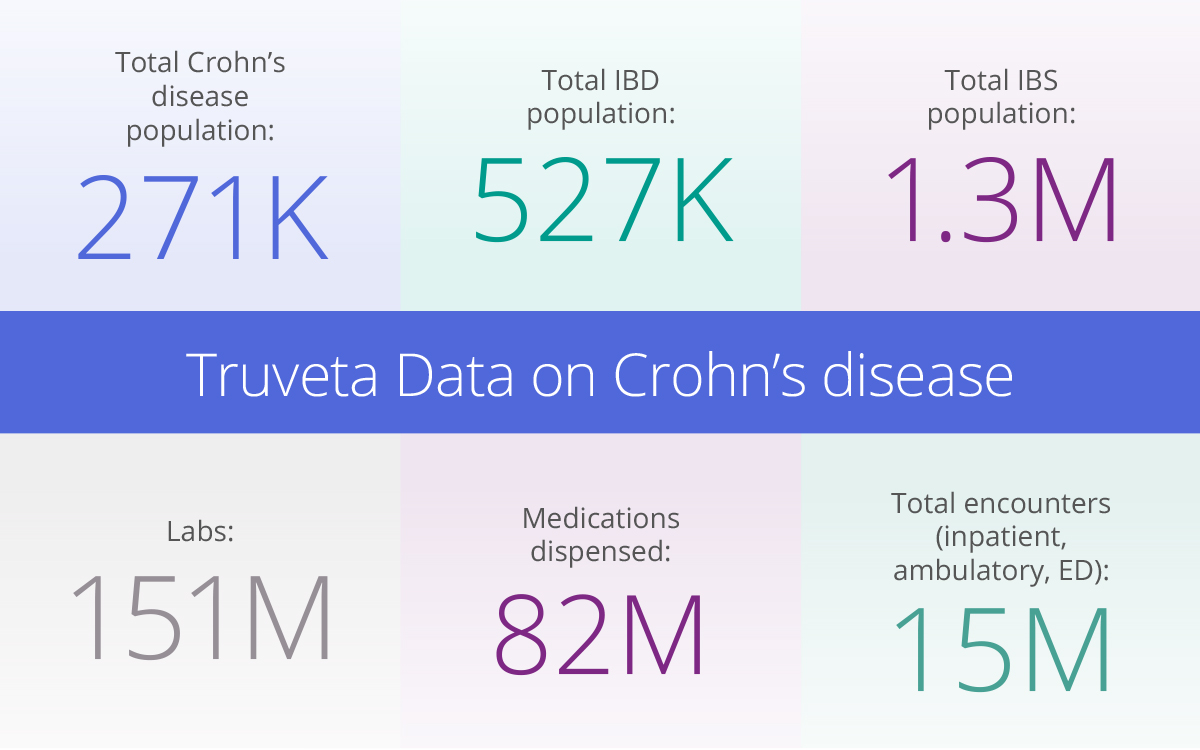
Crohn’s disease, a complex chronic inflammatory disorder of the GI tract, affects approximately 780,000 Americans with an estimated 33,000 new cases diagnosed each year. Crohn’s, along with ulcerative colitis, are the two major forms of inflammatory bowel disease (IBD) which impact approximately 1.3%, or 3 million, US adults. Crohn’s most frequently emerges between the ages of 20-30, with 25% of cases manifesting in childhood or early adulthood. Difficult to predict symptoms – ranging from abdominal pain and diarrhea to fatigue and malnutrition – profoundly impact quality of life, often impeding work, education, social participation, and travel.
Presently, there is no cure for Crohn’s disease. The therapeutic landscape focuses on symptoms management, often termed as controlling “flares.” Treatment modalities include anti-inflammatory medications, general immune system suppressors, antibiotics, and biologics. However, as many as 70% of those with Crohn’s disease will require at least one surgery to remove damaged portions of the digestive tract. Unfortunately for those suffering, surgery does not cure the condition and typically offers only temporary relief.
Using Truveta’s EHR data in Crohn’s disease research
Truveta’s regulatory-grade data includes full patient medical records, notes, and images, linked with claims, SDOH, and mortality data — enabling access to unprecedented clinical depth and a complete view of patient journeys.
Unlike conventional claims data (which can suffer months-long delays), Truveta Data is updated daily from more than 30 health systems and includes over 100 million patients across the US. This rich, patient-level data empowers researchers and life science leaders to conduct robust safety monitoring, demonstrate real-world comparative effectiveness, accelerate clinical trials, and identify novel therapeutic targets or opportunities for label expansion.
Below, we examine the Crohn’s disease population available for research within Truveta, with a focus on the insights available via clinical notes, lab results, and medication/pharmacy details.

Meaningful insights from clinical notes
Insights from clinical notes have previously been hidden and inaccessible to researchers. With Truveta Language Model trained on the largest collection of complete and representative medical records, billions of data points are available to study patient care and outcomes.
With notes, researchers can access patient functional status, along with how they are reacting to certain medications or reasons for medication change. Functional status is often the single most important metric in studying disease course and is unavailable in most data sources. Since symptoms of Crohn’s disease tend to be unique for any given patient, notes may indicate which symptoms are present, frequency and general severity of symptoms, triggers, special diet information, and vitamins or supplements a patient is taking. This level of detail offers promising new ways to approach safety monitoring, comparative effectiveness, and closing care gaps.
Complete lab results specific to Crohn’s disease
There is no known cause for Crohn’s, nor a single test to diagnose. As the disease can present differently in individuals and share symptoms with many other conditions, it can be frustratingly hard to diagnose. Doctors may use a range of tests, including blood tests, stool tests, CT or MRI, colonoscopy and tissue biopsy.
With the inclusion of full lab tests and results, imaging study results, and biopsy reports, Truveta Data can be used (amongst other use cases) to distinguish between patients who have true inflammation leading to inflammatory bowel disease (IBD, either Crohn’s or ulcerative colitis) vs. those with irritable bowel syndrome (IBS). For example, a researcher can pinpoint scores for fecal calprotectin tests, a protein in white blood cells used as a biomarker to identify gastrointestinal inflammation (typical scores being <50 mcg/g). If these levels are not elevated, the patient most likely has IBS and not IBD. Truveta Data currently includes over 71K results for this test.
Medication and pharmacy data
Truveta’s in-depth medication data includes med requests, medications administered, dispense data, and prescription fill data from specialty pharmacies. Researchers can view dispense date, quantity, number of days supplied, and whether a medication was filled or refilled (or not). This information enables studies around safety and effectiveness, medication adherence, and adverse events.
Data from specialty pharmacies are critical for studying patients with complex medical conditions, including autoimmune conditions like Crohn’s disease. These specialty pharmacies provide information on biologics that require intravenous infusion, including those approved for the treatment of Crohn’s such as adalimumab (aka Humira, 514k events), and infliximab (aka Remicade, 832K events).
In May 2023, the first oral drug, upadacitinib (Rinvoq), was approved for the treatment of Crohn’s. Researchers can find over 6K events for this medication in Truveta Studio today.
In addition to the medication-specific numbers, researchers can analyze per-patient social drivers of health attributes, such as education, income, housing stability, social support, and more, to see if those factors play a role in a patient’s access to medication.
Future of Crohn’s disease research and care
The medical research community is working hard to advance the understanding and treatment of Crohn’s disease, with progress around the identification of over 160 genes found to play a role in IBD and establishing the importance of the microbiome. By examining Truveta’s real-world patient data, researchers have many new avenues to uncover patterns and correlations that were previously hidden. This wealth of information can lead to the discovery of novel therapeutics, offering hope for more effective and personalized treatment options for Crohn’s disease.
